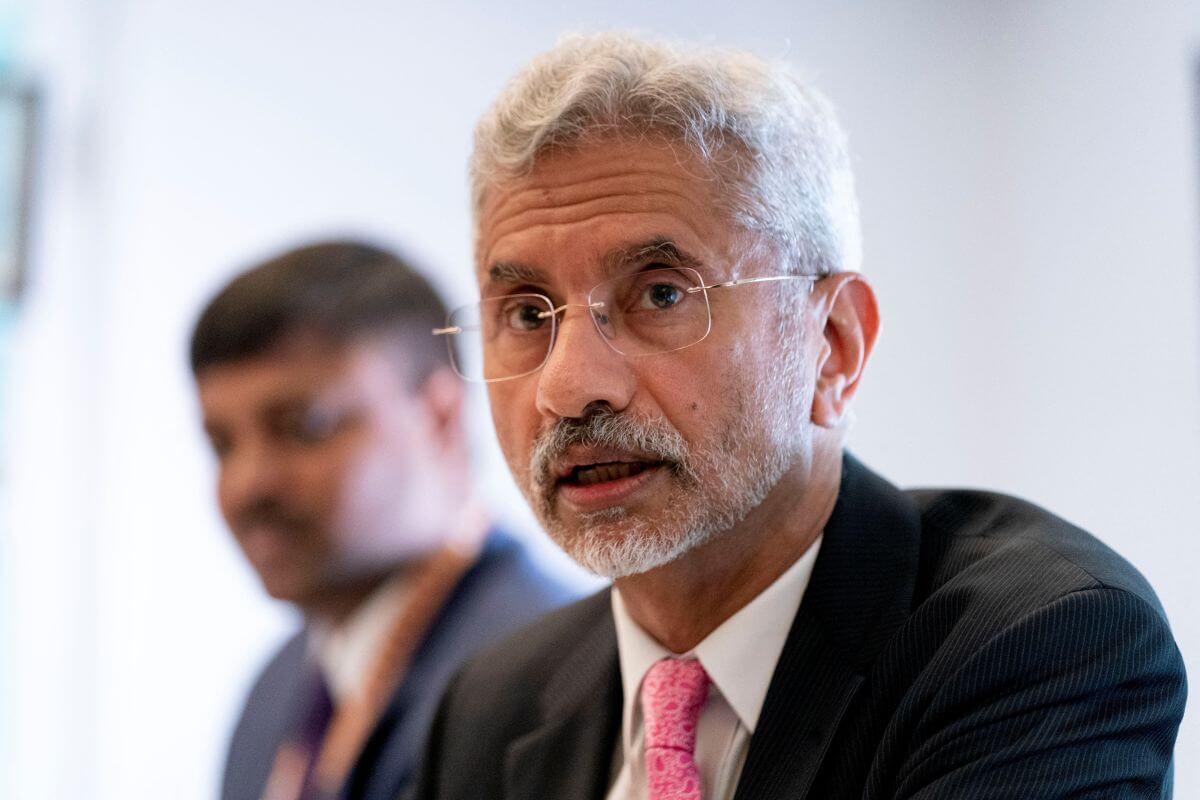In a veiled dig at China, India slammed countries that politicise the United Nations Security Council’s (UNSC) 1267 sanctions regime and defend “proclaimed terrorists,” warning that they do so at “their own peril” and to the detriment of their own “reputation” and “interests.”
Addressing the United Nations General Assembly (UNGA), Indian External Affairs Minister (EAM) S. Jaishankar remarked that, as a member of the UNSC, India has “acted as a bridge on serious and divisive issues,” such as maritime security, peacekeeping, and countering terrorism. In this regard, he noted that India will host a meeting as the chair of the Counter-Terrorism Committee later this year to establish a “global architecture” that combats “new tech tools” being deployed against “open, diverse, and pluralistic societies.”
He reiterated India’s commitment to a “zero tolerance” policy for cross-border terrorism and said such attacks have no justification, positing that no rhetoric can “hide blood-stained hands.”
— Dr. S. Jaishankar (@DrSJaishankar) September 24, 2022
Jaishankar also emphasised on the need to reform multilateral organisations, including the UNSC, describing them as “anachronistic and ineffective” structures that deny “entire continents and regions a voice.”
In particular, the Indian EAM raised concern about the use of “procedural tactics” to hamper critical discussions, in a reference to China’s decision earlier this month to block a joint effort by India and the United States (US) in the UNSC to designate Lashkar-e-Taiba (LeT) commander Sajid Mir as a ‘global terrorist’ under the United Nations (UN) 1267 sanctions list. Previously, China has also thwarted attempts by India and the US to place LeT Deputy Chief Abdur Rahman Makki and Jaish-e-Mohammad deputy chief Rauf Azhar on the UNSC’s sanctions list.
Jaishankar also addressed security concerns in the Indo-Pacific, where climate events have worsened.
Moreover, he stressed that India will “remain firmly” on the “side of peace” in the Ukraine conflict, and “respect the UN charters” and fully support calls for “dialogue and diplomacy.” He noted that in light of the impact of the war on food and energy security, countries must find an early resolution.
Nevertheless, he said that while the Ukraine war has been attracting “global attention,” New Delhi remains committed to other crises, specifically those in its neighbourhood. In this regard, he called on the global community to “rise above narrow national agendas.”
To this end, he lauded India’s efforts to fill gaps in “humanitarian needs” that are ignored due to “political complexity,” noting that it had provided wheat and other essential medical provisions to Afghanistan, food and vaccines to Myanmar, and fuel, essential goods, and trade settlements to Sri Lanka.
Good to meet @UNDP Administrator @ASteiner today afternoon.
— Dr. S. Jaishankar (@DrSJaishankar) September 24, 2022
The UNDP has been a solid partner of India to advance South-South cooperation . Our discussions focused on how to take this further. #UNGA pic.twitter.com/gkR2M2wIQ5
Jaishankar also underscored India’s commitment to global harmony, remarking that it has supplied vaccines to over 100 countries and led evacuations in “Humanitarian Assistance and Disaster Relief” situations to help other countries’ citizens.
He also recognised “the sharp deterioration in the international landscape,” specifically with the onset of the COVID-19 pandemic, which he said has pushed developing countries into “precarious” debt. He raised concern about the rising costs and threats to fuel, food, and fertiliser security, which have worsened with the “trade disruptions and diversions” caused by the Ukraine conflict.
Foreign Minister Everly Paul Chet Greene of #AntiguaandBarbuda recalls that India was the very first country to provide much needed vaccines…#IndiaAt75 event in margins of #UNGA 77@DrSJaishankar @IndianDiplomacy pic.twitter.com/whtHT6Oz2r
— India at UN, NY (@IndiaUNNewYork) September 25, 2022
Jaishankar remarked that just like the COVID-19 pandemic, developing countries will be most impacted by these global issues, pushing members to “recognise this unfairness” and ensure that issues like inequitable vaccine distribution should not be repeated in other equally pressing matters.
Jaishankar argued that the COVID-19 pandemic and the Ukraine war’s role have revealed the “over-centralised nature of globalisation” and the importance of security in the global supply chain.
Apart from these two factors, Jaishanakar said climate change has also disrupted supply chains. In this regard, he reiterated India’s commitment to technological advancement and vowed to coordinate with the international community through mechanisms like the International Solar Alliance, the ‘One Sun, One World, One Grid’ Initiative, and the Coalition for Disaster Resilience Infrastructure. He also reaffirmed India’s commitment to the Paris Agreement and the conclusions reached during the COP26 meeting.
In addition, Jaishankar highlighted India’s “steadfast commitment to South-South cooperation” and vowed to work on issues such as debt, economic growth, and food and energy security during India’s G20 presidency, which is set to begin in December this year.
Listen in to Foreign Minister Ioannis Kasoulides of #Cyrus acknowledging India’s “significant” peacekeeping credentials…#IndiaAt75 event in margins of #UNGA 77@DrSJaishankar @IndianDiplomacy pic.twitter.com/i3VQJwfZIU
— India at UN, NY (@IndiaUNNewYork) September 25, 2022
While speaking about “growth, development, and prosperity” in 2022, Jaishankar said India is working on “rejuvenating a society pillaged by centuries of foreign attacks and colonialism.” He underlined the country’s continued commitment to a “democratic framework” that allows “authentic voices and grounded leadership.”
Lastly, he reiterated Prime Minister Narendra Modi’s “New India” vision that he announced on the 75th Independence Day in August this year. The vision relies on five pledges: making India a developed country in the next 25 years, liberating India from the colonial mindset and reforming multilateralism, leveraging the country’s rich heritage by using traditional ethos in climate action, promoting unity and solidarity on global issues, and instilling civic consciousness in nations and citizens.

